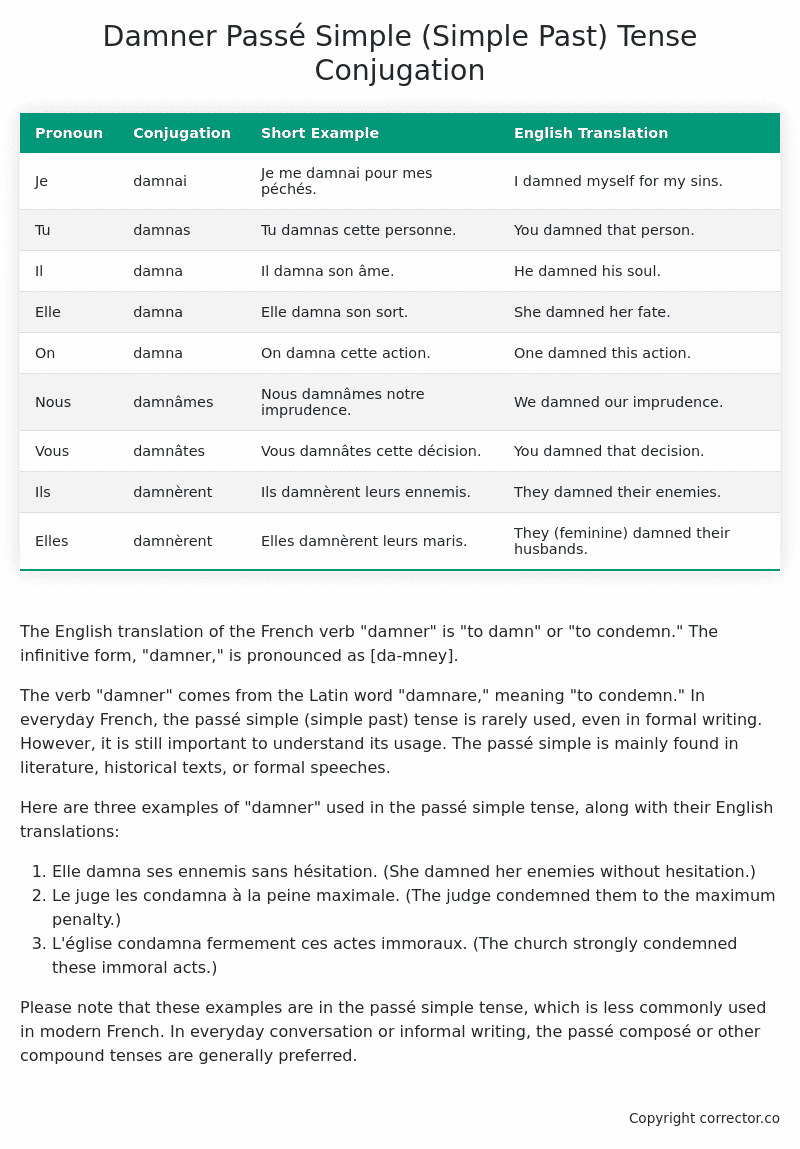Passé Simple (Simple Past) Tense Conjugation of the French Verb damner
Introduction to the verb damner
The English translation of the French verb “damner” is “to damn” or “to condemn.” The infinitive form, “damner,” is pronounced as [da-mney].
The verb “damner” comes from the Latin word “damnare,” meaning “to condemn.” In everyday French, the passé simple (simple past) tense is rarely used, even in formal writing. However, it is still important to understand its usage. The passé simple is mainly found in literature, historical texts, or formal speeches.
Here are three examples of “damner” used in the passé simple tense, along with their English translations:
- Elle damna ses ennemis sans hésitation.
(She damned her enemies without hesitation.) - Le juge les condamna à la peine maximale.
(The judge condemned them to the maximum penalty.) - L’église condamna fermement ces actes immoraux.
(The church strongly condemned these immoral acts.)
Please note that these examples are in the passé simple tense, which is less commonly used in modern French. In everyday conversation or informal writing, the passé composé or other compound tenses are generally preferred.
Table of the Passé Simple (Simple Past) Tense Conjugation of damner
| Pronoun | Conjugation | Short Example | English Translation |
|---|---|---|---|
| Je | damnai | Je me damnai pour mes péchés. | I damned myself for my sins. |
| Tu | damnas | Tu damnas cette personne. | You damned that person. |
| Il | damna | Il damna son âme. | He damned his soul. |
| Elle | damna | Elle damna son sort. | She damned her fate. |
| On | damna | On damna cette action. | One damned this action. |
| Nous | damnâmes | Nous damnâmes notre imprudence. | We damned our imprudence. |
| Vous | damnâtes | Vous damnâtes cette décision. | You damned that decision. |
| Ils | damnèrent | Ils damnèrent leurs ennemis. | They damned their enemies. |
| Elles | damnèrent | Elles damnèrent leurs maris. | They (feminine) damned their husbands. |
Other Conjugations for Damner.
Le Present (Present Tense) Conjugation of the French Verb damner
Imparfait (Imperfect) Tense Conjugation of the French Verb damner
Passé Simple (Simple Past) Tense Conjugation of the French Verb damner (You’re reading it right now!)
Passé Composé (Present Perfect) Tense Conjugation of the French Verb damner
Futur Simple (Simple Future) Tense Conjugation of the French Verb damner
Futur Proche (Near Future) Tense Conjugation of the French Verb damner
Plus-que-parfait (Pluperfect) Tense Conjugation of the French Verb damner
Passé Antérieur (Past Anterior) Tense Conjugation of the French Verb damner
Futur Antérieur (Future Anterior) Tense Conjugation of the French Verb damner
Subjonctif Présent (Subjunctive Present) Tense Conjugation of the French Verb damner
Subjonctif Passé (Subjunctive Past) Tense Conjugation of the French Verb damner
Subjonctif Imparfait (Subjunctive Imperfect) Tense Conjugation of the French Verb damner
Subjonctif Plus-que-parfait (Subjunctive Pluperfect) Tense Conjugation of the French Verb damner
Conditionnel Présent (Conditional Present) Tense Conjugation of the French Verb damner
Conditionnel Passé (Conditional Past) Tense Conjugation of the French Verb damner
Conditionnel Passé II (Conditional Past II) Tense Conjugation of the French Verb damner
L’impératif Présent (Imperative Present) Tense Conjugation of the French Verb damner
L’impératif Passé (Imperative Past) Tense Conjugation of the French Verb damner
L’infinitif Présent (Infinitive Present) Tense Conjugation of the French Verb damner
L’infinitif Passé (Infinitive Past) Tense Conjugation of the French Verb damner
Le Participe Présent (Present Participle) Tense Conjugation of the French Verb damner
Le Participe Passé (Past Participle) Tense Conjugation of the French Verb damner
Struggling with French verbs or the language in general? Why not use our free French Grammar Checker – no registration required!
Get a FREE Download Study Sheet of this Conjugation 🔥
Simply right click the image below, click “save image” and get your free reference for the damner Passé Simple tense conjugation!

Damner – About the French Passé Simple (Simple Past) Tense
Formation
Usage
Narration
Historical Context
Interactions with other tenses
Passé Composé
Imparfait
Conditional and Subjunctive
Summary
I hope you enjoyed this article on the verb damner. Still in a learning mood? Check out another TOTALLY random French verb conjugation!


